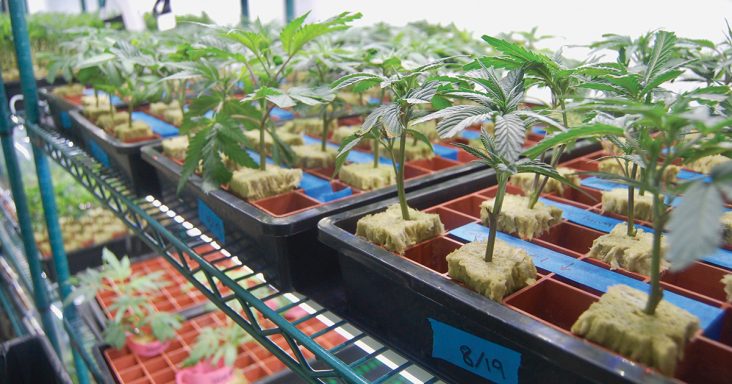Supreme Court rules in favor of River Valley Relief in marijuana cultivation license dispute
by April 11, 2024 6:53 pm 1,446 views

Marijuana pictured inside River Valley Relief in Fort Smith, one of the eight licensed marijuana cultivation sites in Arkansas.
The Arkansas Supreme Court has ruled in favor of Fort Smith-based River Valley Relief (RVR) in a medical marijuana cultivation license dispute. The court reversed and remanded a lower court’s ruling, with two judges dissenting, and vacated a summary judgment against RVR.
Thursday’s (April 11) court decision sends the matter back to the Pulaski County Circuit Court.
Pulaski County Circuit Court Judge Herb Wright ruled in early November 2023 for a claim by 2600 Holdings that the Arkansas Medical Marijuana Commission (MMC) erred in granting RVR the license in July 2020. 2600 Holdings filed a lawsuit in January 2021, asking the court to disqualify RVR and grant the license to 2600 or provide other relief through the Arkansas Administrative Procedures Act. In his ruling, Judge Wright said 2600 has proven it should be given relief, and the MMC acted outside its authority – ultra vires – in granting the license to RVR.
2600 attorneys alleged that MMC illegally granted RVR owner Storm Nolan a license during a second round of awarding cultivation licenses. The action was illegal because the incorporation in Nolan’s first application was no longer valid, and the proposed center was too close to the Sebastian County Juvenile Detention Center, according to the complaint filed by 2600. The law regulating Arkansas’ medical marijuana requires centers to be at least 3,000 feet away from a school, church or daycare.
Nolan and his attorneys rebutted what they claimed were key erroneous findings in Wright’s order. One was that the original RVR application was within 3,000 feet of a school, which would violate MMC rules for a cultivation center. The original location was within 2,400 feet of the Sebastian County Juvenile Detention Center, which is not a school.
In late November 2023, then-MMC Director Doralee Chandler revoked the RVR cultivation license. The revocation was temporarily blocked by the RVR’s appeal to the Arkansas Supreme Court. At the time, the RVR had about 75 employees, and company owners had invested “more than $8 million” into the licensing and operation of the cultivation center.
The majority opinion did not rule definitively on the allegations by 2600 Holdings but held that Nolan was not properly granted the opportunity to defend his license during the lower court process.
“Whether 2600 Holdings is ultimately correct in its allegations and legal attack on the Commission’s decision to grant Nolan a license is not before us. But Rule 19(a) requires that Nolan be joined as an indispensable party. We find that the circuit court erred as a matter of law in not joining Nolan as an indispensable party to the litigation. Because the November 3, 2022 order that granted summary judgment for 2600 Holdings was entered without Nolan as an indispensable party, it is vacated,” noted part of the majority opinion written by Associate Justice Rhonda Wood.
Justices Karen Baker and Shawn Womack dissented, with Baker saying sovereign immunity prevents the court from reversing an MMC action.
“While I recognize that the present appeal stems from the circuit court’s failure to join Nolan as an indispensable party, I must dissent because the underlying grant of summary judgment in favor of 2600 Holdings – vacated by the majority – involves State action and therefore implicates sovereign immunity,” Baker noted in her dissent.
Nolan declined to comment on Thursday’s decision.
